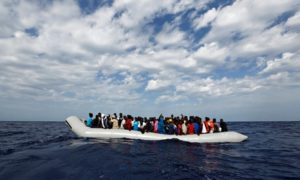
“With the beginning of the new season we have a range of journeys on offer. Turkey Libya Italy, $3,800. Algeria Libya Italy, $2,500. Sudan Libya Italy, $2,500… The boats are all wood… If you have questions, contact me on Viber or WhatsApp.”
This is not an ad from a travel brochure. It’s a Facebook update posted by a people smuggler, Abdul Aziz, from the Libyan port of Zuwara on 21 April. Abdul Aziz is just one of hundreds of smugglers now using social media to promote their services to migrants and refugees trying to reach Europe.
Their pages advertise everything from fake documents to safe passage by land, air, or sea. Many are illustrated with photos of luxury cruise liners or crisp new passports, and include package deals – “Kids go free” is a popular offer – as well as glowing testimonies that purport to be from migrants who have made the journey.
But behind the glib promises and the slick online communications is a ruthless real-world web of smugglers and con men who thrive on the vulnerability of the migrants.
This web extends not only across the Mediterranean and the Middle East but deep into sub-Saharan Africa. Abdul Aziz alone claims to have agents in “almost every Arab state” and says “if people can’t get here to Libya, I have legal and illegal ways to get them into the country.”
The network that links a boat-runner like Abdul Aziz to a passport forger in Istanbul or a truck driver in Eritrea is an underground, ever-shifting configuration of personal contacts, criminal gangs, and one-off business deals that runs across national borders and is almost impossible to police.
Read more at bbc.com


